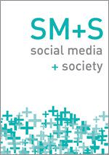
Social Media + Society
Scope & Guideline
Unpacking the Influence of Social Media on Our Lives
Introduction
Aims and Scopes
- Social Media and Identity Construction:
Research exploring how social media platforms facilitate identity formation, self-presentation, and the negotiation of personal and collective identities across various demographics. - Political Communication and Activism:
Investigations into social media's role in political discourse, activism, and public engagement, analyzing how online platforms influence political behavior and mobilization. - Mental Health and Well-Being:
Studies examining the impact of social media use on mental health, including both positive and negative effects, and how online interactions influence emotional well-being. - Disinformation and Misinformation:
Research focused on the spread of false information through social media, its implications for public opinion, trust in media, and strategies for combating misinformation. - Cultural Practices and Community Building:
Exploration of how social media fosters community, cultural practices, and social norms, including the role of memes, hashtags, and digital storytelling. - Digital Governance and Platform Dynamics:
Analysis of the governance structures of social media platforms, including content moderation, algorithmic biases, and the implications for user agency and freedom of expression.
Trending and Emerging
- Intersectionality in Social Media Studies:
An increasing focus on how social media intersects with various social identities, including race, gender, and sexuality, emphasizing the importance of diverse narratives and experiences. - Mental Health Narratives and Support:
Research exploring the role of social media in mental health discussions and support networks, particularly during crises such as the COVID-19 pandemic, highlighting the platform's potential for fostering community and resilience. - Influencer Culture and Digital Economy:
A growing interest in the impact of influencers on consumer behavior, political discourse, and cultural trends, reflecting broader shifts in marketing and communication strategies. - Digital Activism and Social Movements:
Emerging studies on how social media facilitates grassroots activism, particularly in response to social justice movements, showcasing the platform's role in mobilizing support and awareness. - Algorithmic Accountability and Ethics:
An increasing emphasis on the ethical implications of algorithms that govern social media interactions, including concerns about bias, misinformation, and the need for transparency in platform governance. - Technological Integration and Hybrid Spaces:
Research focusing on the convergence of social media with other technologies (e.g., AI, VR) and how these integrations create new forms of interaction and community engagement.
Declining or Waning
- Traditional Media Comparisons:
Research comparing social media to traditional media has seen a decrease, possibly due to the growing integration of social media into mainstream communication channels and the diminishing relevance of traditional media in certain contexts. - Basic User Engagement Metrics:
Studies focusing on simplistic engagement metrics (likes, shares) are waning, as there is a shift toward more nuanced analyses of user behavior and interaction dynamics. - Geographic and Cultural Specificity:
Research that primarily examines social media phenomena in isolated geographic or cultural contexts is becoming less prevalent, as there is an increasing emphasis on global interconnectedness and comparative studies. - Nostalgic Narratives of Early Social Media:
Discussions centered around the early days of social media and its initial impacts are declining, as the focus shifts to current trends and future implications. - Platform-Specific Studies:
Research that solely concentrates on individual platforms without considering cross-platform dynamics is becoming less common, as scholars recognize the need for comprehensive analyses that account for user behavior across multiple platforms.
Similar Journals
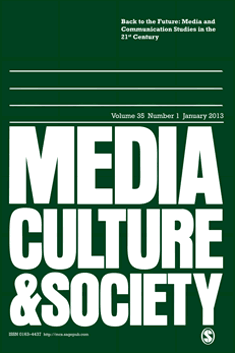
MEDIA CULTURE & SOCIETY
Fostering Critical Dialogue on Media's Influence in Our LivesMEDIA CULTURE & SOCIETY, published by SAGE PUBLICATIONS LTD, is a prominent academic journal dedicated to the interdisciplinary exploration of media, culture, and societal dynamics. With a long-standing history since its inception in 1979 and extending to 2024, this journal serves as a vital platform for researchers, professionals, and students interested in understanding the complex interplay between media and cultural phenomena. Operating from the United Kingdom, it holds a prestigious Q1 ranking in both communication and sociology/political science categories, reflecting its significant impact within these fields. The journal’s Scopus ranks further attest to its excellence, placing it in the top percentiles and making it an essential resource for advancing scholarly discussions. While not open access, MEDIA CULTURE & SOCIETY continues to provide insightful analyses that shape contemporary discourse on the role of media in society, ensuring its relevance and importance to academic communities worldwide.

Revista Comunicacao Midiatica
Illuminating the Intersections of Media and SocietyRevista Comunicação Midiática is a prominent academic journal focusing on the fields of communication, media studies, and cultural dynamics, published by Universidade Estadual Paulista Júlio Mesquita Filho, Facility of Architecture, Arts & Communication. With its ISSN 2236-8000, this journal aims to disseminate innovative research, theoretical advancements, and practical insights that contribute to a deeper understanding of communication processes in contemporary society. Although it currently does not provide Open Access options, the journal serves as a valuable resource for researchers, professionals, and students who are keen to explore the intricate relationships between media and culture. Located in Bauru, Brazil, the journal is committed to fostering multidisciplinary dialogue and enhancing scholarly discourse, making it an invaluable addition to the academic landscape in the realm of media studies.

Review of Communication Research
Bridging Ideas Across Communication DisciplinesReview of Communication Research is a prestigious open-access journal dedicated to advancing the field of communication studies. Published by REVIEW COMMUNICATION RESEARCH from its base in Madrid, Spain, this journal has established itself as a vital platform for scholarly discourse since its inception. With an impressive impact factor and ranked in the Q1 quartile of communication journals for 2023, it holds a commendable position, placing it within the top 13% of approximately 511 journals in the communication category on Scopus. Since becoming open-access in 2013, the journal has enabled researchers, professionals, and students to access high-quality research without financial barriers, thereby fostering a greater dissemination of knowledge and dialogue within the community. Covering a wide array of topics from communication theory to media studies, the Review of Communication Research continues to contribute significantly to the understanding and evolution of communication in today’s interconnected world. Researchers are encouraged to engage with and submit their findings to this influential journal to further enrich the scholarly landscape.
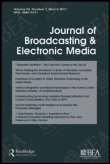
JOURNAL OF BROADCASTING & ELECTRONIC MEDIA
Navigating the Evolving Landscape of MediaThe JOURNAL OF BROADCASTING & ELECTRONIC MEDIA, published by Routledge Journals, Taylor & Francis Ltd, is a premier academic publication in the field of communication, officially recognized in the Q1 category for its exceptional quality and impact. With a rich history dating back to 1985, this journal serves as a vital platform for innovative research and critical discussions surrounding broadcasting and electronic media, addressing contemporary issues in digital communication, media technology, and audience studies. The journal boasts an impressive Scopus rank of #73 out of 511 in the Social Sciences - Communication category, placing it within the top 15% of its field. Researchers, professionals, and students alike benefit from its insightful articles that contribute to understanding the evolving landscape of media and communication. Although it does not currently operate under an Open Access model, its rigorous peer-review process ensures that published works meet high academic standards, sustaining its reputation as a cornerstone for scholarly discourse in the media industry.
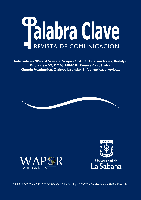
Palabra Clave
Fostering Innovation Through Open AccessPalabra Clave is a leading open-access journal published by the UNIV SABANA, FAC COMUNICACION in Colombia, dedicated to advancing the fields of Arts and Humanities as well as Communication. Since its inception in 2001, the journal has committed to providing a platform for innovative research and critical discourse, garnering an impressive Q2 classification in both respective fields. The journal is indexed in Scopus, with a commendable ranking of #26 out of 173 in Arts and Humanities, representing the 85th percentile, and #263 out of 511 in the Communication category, indicating its significant impact within the academic community. With its converged years from 2012 to 2024, Palabra Clave encourages scholars, professionals, and students to engage with contemporary issues through a lens of interdisciplinary scholarship. Accessible through its open-access model, this journal fosters the democratization of knowledge and aims to connect researchers across the globe.

Communication & Society-Spain
Empowering Scholars to Shape the Future of CommunicationCommunication & Society-Spain, published by Universidad de Navarra, is an esteemed open access journal dedicated to advancing scholarship in the dynamic fields of communication and cultural studies. Since its inception in 1988, the journal has maintained a commitment to disseminating high-quality research that engages with contemporary issues and contributes to the evolving discourse around communication theories and practices. With a commendable Q1 ranking in both Communication and Cultural Studies categories, it stands as a prominent source for researchers and professionals alike, reflecting its robust presence in the academic community—evidenced by its Scopus rankings placing it in the top percentiles within both fields. The journal's scope encompasses diverse perspectives and methodologies, thereby fostering interdisciplinary dialogue essential for understanding the complexities of communication in society. With a publication history that spans from 2010 to 2024 and a ranking of #87 out of 1304 in Cultural Studies, our commitment to open access ensures that impactful research is readily available to all, promoting further scholarly engagement and innovation.
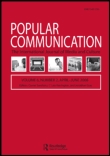
Popular Communication
Advancing Scholarship in Popular CommunicationPopular Communication, published by Routledge Journals, Taylor & Francis Ltd, is a leading academic journal in the field of Communication, recognized for its Q1 ranking in the 2023 Scopus category. With an ISSN of 1540-5702 and an E-ISSN of 1540-5710, this journal has been converging significant research from 2010 to 2024, highlighting contemporary trends and evolving dynamics in popular communication practices. The journal is based in the United Kingdom and focuses on the intersection of media, culture, and communication, making it a vital resource for researchers, professionals, and students interested in understanding the impact of communication in society today. Although it does not offer Open Access options, it remains a cornerstone for scholarly discourse, with an impressive rank of #96 out of 511 in Social Sciences Communication, placing it in the 81st percentile. Contributions to this journal play a critical role in advancing knowledge and encouraging further scholarship in the diverse realm of popular communication.
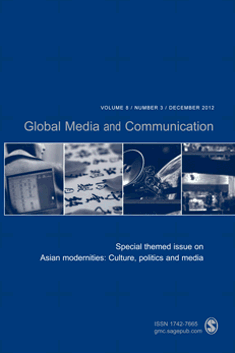
Global Media and Communication
Illuminating the Complex Ties Between Media and CultureGlobal Media and Communication is a premier journal dedicated to advancing the fields of media and communication studies, published by SAGE Publications Ltd. With an ISSN of 1742-7665 and an E-ISSN of 1742-7673, this journal offers a platform for scholarly discourse and innovative research that explores the intricate relationships between global media practices and communication strategies. Recognized as a Q1 journal in both the Arts and Humanities (Miscellaneous) and Communication categories for 2023, it stands out in its commitment to delivering high-quality, peer-reviewed articles that contribute to the understanding of contemporary media landscapes. Located in London, United Kingdom, the journal benefits from being at the heart of cultural and digital innovation. Researchers, professionals, and students can look forward to insightful articles that not only critique existing frameworks but also propose new methodologies, ensuring that Global Media and Communication remains a vital resource for anyone interested in navigating the evolving dynamics of media and communication on a global scale.

Canadian Journal of Communication
Innovating Perspectives on Contemporary CommunicationCanadian Journal of Communication, published by University of Toronto Press Inc., serves as a vital conduit for scholarly discourse within the field of communication studies. With an ISSN of 0705-3657 and an E-ISSN of 1499-6642, this esteemed journal holds a Q2 ranking in the category of Communication according to 2023 metrics, reflecting its commitment to high-quality research and innovation. Located in Canada and covering converged years from 2016 to 2024, the journal provides a comprehensive platform for the exchange of ideas, critical analyses, and theoretical advancements that shape our understanding of communication in contemporary society. Although it does not currently offer open access, the journal’s influence is demonstrated by its position in Scopus, ranking #332 out of 511 in the Social Sciences Communication category. This publication is essential for researchers, professionals, and students seeking to deepen their knowledge in communication contexts and explore the intricate dynamics that define human interaction.

Revista Mediacao
Connecting Ideas, Enriching Discourses.Revista Mediação is an esteemed academic journal dedicated to the fields of education, culture, and applied social sciences, published by UNIV FUNDACAO MINEIRA EDUCACAO & CULTURA-FUMEC. Since its inception in 2001, this Open Access journal has aimed to foster dialogue and innovation among researchers, professionals, and students seeking to explore the intersections of theory and practice within the social sciences. With an ISSN of 1676-2827 and an E-ISSN of 2179-9571, the journal maintains a commitment to disseminating high-quality, peer-reviewed research that contributes to the understanding and development of cultural and educational frameworks. Set in Belo Horizonte, Brazil, Revista Mediação plays a critical role in the academic community by providing a platform for thought-provoking articles that engage with current issues and promote scholarly exchange on a global scale.